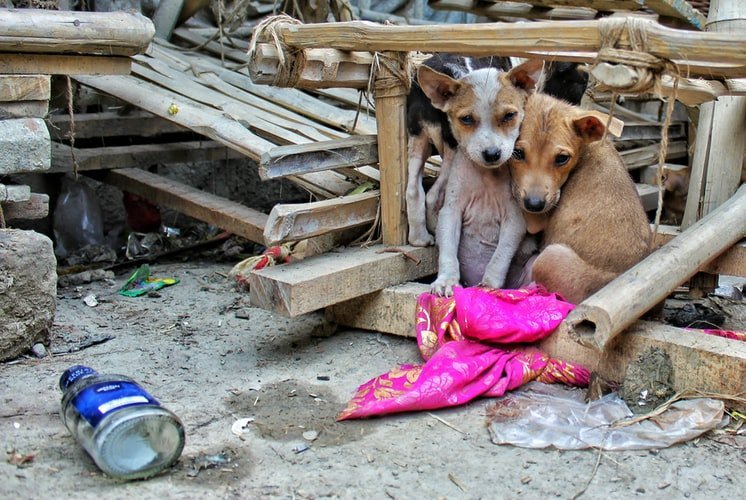
Buddhist Monk Has Saved Tens of Thousands of Stray Dogs in the Last 27 Years
Published on June 30, 2021 at 1:05 PM by Mc Noel Kasinja
A Buddhist monk in Shanghai, China, has dedicated more than half of his life to caring for stray dogs, rescuing and taking care of tens of thousands of them since 1994.
53-year-old Zhixiang is the head monk of the Bao’en Temple in Shanghai, but nowadays his disciples take care of most of the day-to-day business, as he spends all his time taking care of the rescued animals. There are currently around 8,000 dogs, not to mention hundreds of cats, as well as chickens, geese and peacocks in Zhixiang’s care, but he’s been rescuing abandoned and stray animals since 1994, so he is used to it. Over the years, he has learned to administer medicine and give the animals shots, as taking them all to a vet would be too costly, and only recently started taking donations from other animal lovers, as a ways to make ends meet.
Zhixiang’s mission as a rescuer of stray animals began in 1994. He was riding in a car on the highway when he witnessed a cat being hit by another vehicle. It wasn’t dead, but it was left severely injured, struggling to crawl to the side of the road with only two paws. It’s an image that the Buddhist monk hates to remember and the one that pushed him to start rescuing strays.
In the beginning it was just cats; He would carry paper bags with him to pick up and bury the bodies of strays killed on the street, and take those that could be saved to the vet. Eventually, he just started driving around with no other purpose than to find animals in need of help. After moving to Bao’en Temple, in 2006, it became apparent that dogs were even more of a problem than cats, so he started dedicating more time to them.
Most of the dogs in Zhixiang’s care come from the public shelter in Fengxian, where most of the dogs would be put down or starve to death if not for his intervention. He takes them to the temple for a few days to keep them under observation and give them any required medication, before sending the healthy ones to a rented shelter in Pudong, where most of the 8,000 dogs are kept.
A few hundred of the dogs in his care will likely be resettled in the US or European countries, but for most of them Zhixiang is the last hope to a decent life. Occasionally, people will come and ask to adopt a dog as a pet or for guarding their property, but he won’t simply give them just anyone, especially if the person has a bad reputation as a dog owner.
Until 2017, Zhixiang never accepted any monetary donations from anyone, telling them to donate food, because that was all the animals needed. But as the number of stray dogs brought in grew, he understood that he couldn’t keep doing this all by himself, not without spending the temple’s money, which was out of the question.
“I didn’t accept a donation until January 15, 2017. Until then, when people wanted to make a donation, I said no, the animals don’t need money, they just need food to eat — you can help by donating supplies,” Zhixiang told Smart Shanghai. “I was keeping the animals in Bao’en Temple. At one point, I had dogs, cats, chickens, ducks, geese and a peacock. But the temple was too small.”
“So in 2019, I rented this shelter in Dagang, Pudong, where they would let me keep animals. It’s 9,000 square meters; rent is about 1,570,000RMB a month. I have seven people working there. We go through one ton of dog food every day. There are about 5,000 dogs and it costs three RMB to feed a dog for a day. You do the math, you figure out how much it costs,” he added.
China has a serious stray dog problem. In 2019, there were around 50 million stray dogs in China, with that number roughly doubling every year. Zhixiang thinks that it’s not the Government’s or the animals’ fault, but that of so-called animal lovers who think simply feeding stray animals without first neutering them is a kind thing to do. Obviously, irresponsible pet owners who simply abandon them are to blame as well.
“When you feed stray cats in your neighborhood but don’t take them for neutering first, then the number of the cats will soon exceed what the neighborhood can bear,” the monk told Shine Magazine. “Then other people complain and want the cats sent away for euthanasia. You do more bad than good in feeding stray cats. The road to hell is always paved with good intentions.”
Despite earning the admiration of millions in China and abroad for dedicating nearly three decades of his life to rescuing and caring for stray animals, Zhixiang claims that there are people who either don’t understand why he does it, or even criticize him for doing so.
“Sometimes people who come to worship at the temple don’t understand why I do this. Maybe they think that monks should sit in a temple all day chanting scriptures. But Buddha tells us to save lives and that all lives are equal,” he said, adding that some even tell him to stop rescuing animals because they have karma.
“But how can I stop? Letting them be does not mean watching them die without lifting a finger. I try my best. It is then their fate if they survive or not. That’s what ‘letting them be’ means to me,” the monk added.
Despite the hardships he faces every day, Zhixiang plans to continue his work with stray animals at least until he retires, as 65. Until then, he hopes to find someone to continue his project and ensure that the animals are well taken care of.
Zhixiang’s dedication reminded us of other kindhearted animal lovers we’ve featured on OC over the years, like Mohammad Alaa Jaleel (The Cat Man of Aleppo), Serbia’s Sasha Pesic, or India’s very own Dog Father, Rakesh Shukla, just to name a few.
Subscribe to our Youtube Channel:


